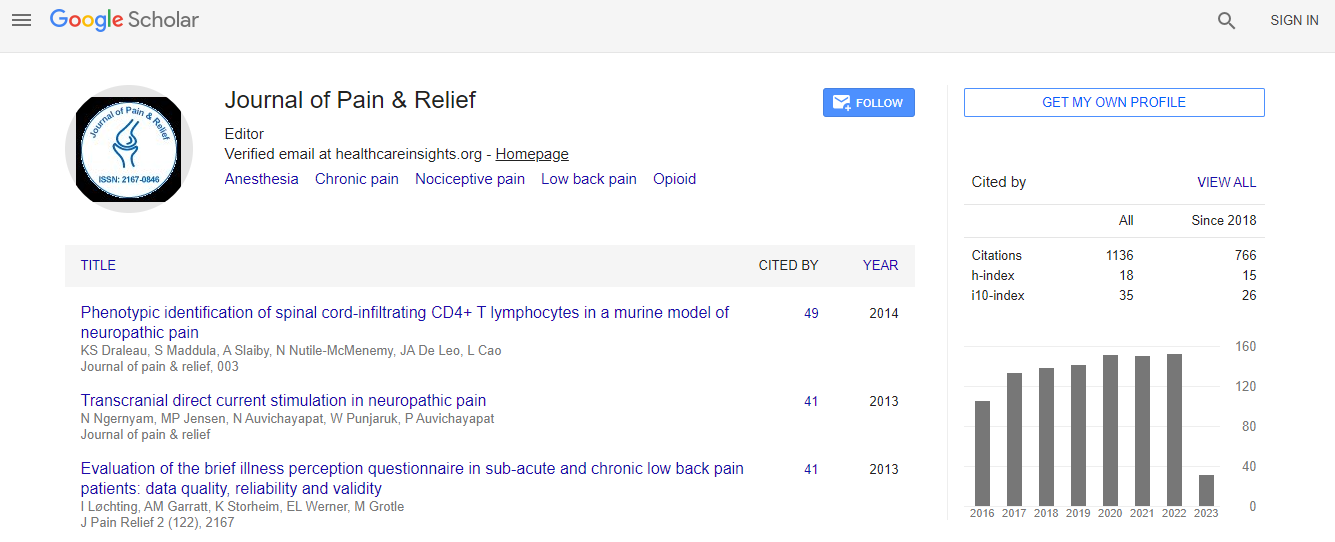Research Article
Prevalence Of Stigmatization And Poor Self-Esteem In Chronic Pain Patients
| Hegarty D* and Wall M | |
| Department Anaesthesia & Pain Medicine, Cork University Hospital Group, Ireland | |
| Corresponding Author : | Dr. Dominic Hegarty Consultant in Pain Management & Neuromodulation Department Anesthesia & Pain Medicine Cork University Hospital, Cork, Ireland Tel: +353 21 4922135 E-mail: dominichegarty@hotmail.com |
| Received January 11, 2014; Accepted February 19, 2014; Published February 21, 2014 | |
| Citation: Hegarty D, Wall M (2014) Prevalence of Stigmatization and Poor Self-esteem in Chronic Pain Patients. J Pain Relief 3:136. doi: 10.4172/2167-0846.1000136 | |
| Copyright: © 2014 Hegarty D, et al. This is an open-access article distributed under the terms of the Creative Commons Attribution License, which permits unrestricted use, distribution, and reproduction in any medium, provided the original author and source are credited. | |
Abstract
Objective: Stigma and poor self-esteem (defined as the internalized cognitive, emotional, and behavioural impact of others’ negative attitudes on a person) are associated with many chronic health conditions and have indirect but strongly negative implications for clinical prognosis. We sought to estimate the prevalence of perceived stigmatization and self-esteem in chronic pain patients and its relationship with general health markers.
Methods: All adult patients (n=160, >18 years old, chronic pain >3 months) completed a set of validated questionnaires; Stigmata Scale for Chronic Illness (SSCI), Rosenberg’s Self-esteem Scale (RSES); Hospital Anxiety Depression Scale (HADS); Brief Pain Inventory short form (BPI); and the General health survey (SF12v2). Data was recorded using Microsoft Excel and analyzed using SPSS.
Results: The mean pain intensity score (Visual analogue score (VAS)) was 6.1 ± 1.7. 77% of patients (123/160) had a lowered self-esteem (RSES score=17.2 ± 14.5) with a mean SSCI score of 50.8 ± 19.0 (normal range 24-120). An inverse relationship between (a) stigmatization and self-esteem (Pearson correlation, r=.58, p<0.001) and (b) selfesteem and pain interference (r=.48, p<0.001) was identified. A positive correlation between stigmatization and anxiety (r=.228, p<.05) and an inverse relationship between self-esteem and depression existed (r=.234, p<.05).
Conclusions: A high prevalence of stigmatization was identified in individuals experiencing chronic pain and a significant correlation exists between the type of stigma experienced, the level of pain intensity and other psychological factors including self-esteem, anxiety, and depression

 Spanish
Spanish  Chinese
Chinese  Russian
Russian  German
German  French
French  Japanese
Japanese  Portuguese
Portuguese  Hindi
Hindi 
